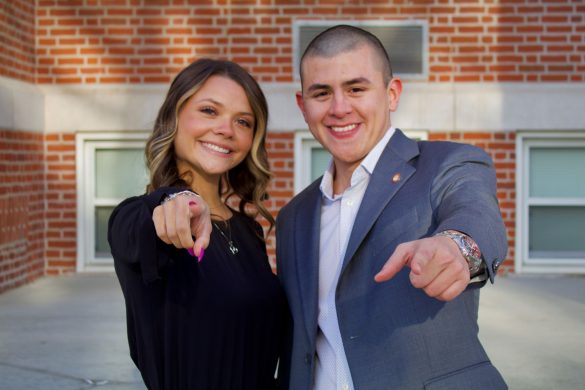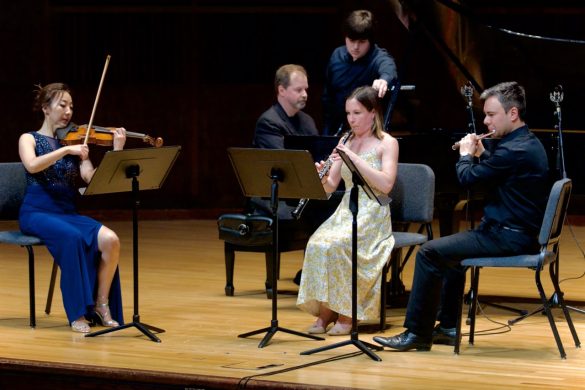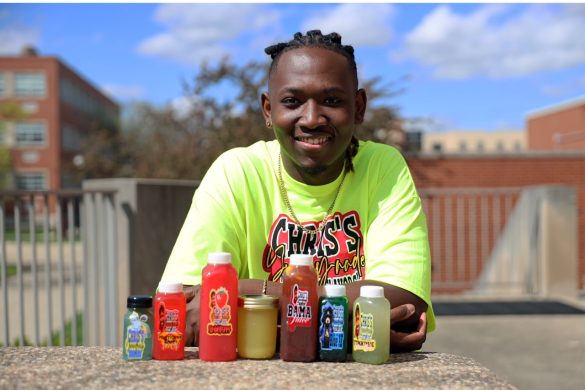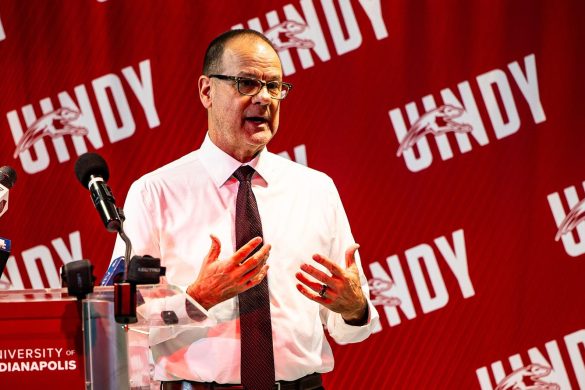
In the scene pictured above, (from left) Sarah, Vicky, Aaron Grinter and Joshua Short played college students at a party. Vicky was trying to get Sarah to leave because she was very drunk, but Sarah did not want to go. Photo by Zoë Berg.
Every 98 seconds, a person in the United States is sexually assaulted, according to the Rape, Abuse & Incest National Network, and college aged women are at an elevated risk of sexual violence. Because April is Sexual Assault Awareness Month, the University of Indianapolis is hosting a number of event to raise awareness about sexual assault and the importance of consent. “The Power of Consent: Empowering Students to Prevent Campus Assault” is a 60-minute interactive performance with guided conversations performed by Sapphire Theatre Company and came to UIndy on April 4.
The performance consisted of four scenes in which actors Aaron Grinter, Joshua Short, Vicky and Sarah acted out scenarios that could happen to any college student, including talking about sexual assault with a sibling and making questionable choices at a party. Between scenes the audience was asked to discuss what they saw and how the characters could have handled the situation differently.
Education Program Manager for the Sapphire Theatre Company Andrea Lott Harvey and Corporate Programs Manager for the Sapphire Theatre Company Nick Carpenter acted as narrators for the scenes and facilitated the conversations with the audience. According to Harvey, sexual assault is a societal problem and victims should not be blamed for being assaulted. Carpenter said the goal of the performance was to raise awareness about consent and to reduce the misconceptions.
“So much of what we hear, from the male perspective, is that there is so much fear around consent and ‘Am I going to get accused?’” Carpenter said. “If you know what [consent] is and you are willing to communicate, then it’s not going to be an issue.”
The final scene focused on a man who was sexually assaulted and was trying to tell his best friend about it. Sophomore music education major Emily Larmore attend the performance and said the performance was good because people could learn that men can also be victims of sexual assault.
“I think that whatever gender you are, sexual assault can still affect you and I think everyone should know that,” Larmore said. “It could happen to anybody.”
Sapphire Theatre Company partnered with Planned Parenthood for the performance. Senior Educator and Youth Specialist for Planned Parenthood of Indiana and Kentucky Candice Gary helped write the performance and research various policies about sexual assault.
“We went over a variety of different combinations of the roles,” Gary said. “We wanted to look for a variety of genders and sexualities and ages [and relationships, which included] having parent relationships… siblings, friends talking to each other, folks who are honestly just acquaintances. [We wanted to show] how all of those interactions are real and take out that whole stranger danger level of it and connect it with real folks that people can relate to in their own individual lives.”
Grinter said the actors may not have experienced some of the situations personally, but that they try to make them feel as real as possible. Short said he has been able to learn from the experience and put himself in the shoes of someone who may experience them.

Members of the Sapphire Theatre Company said that audience members were both responsive and engaged with the performance. Before the performance, audience members could take bracelets that said “NO More.” Photo by Zoë Berg.
After each scene the audience was given the chance to interact with the actors and ask them questions. Short said the actors try not to agree with the audience members because in life there may not be a clear solution.
“We always try to play the devil’s advocate and never really agree with what the audience is saying because it makes them think deeper about a more realistic solution,” Short said. “It’s really fun being up there knowing we’re not actually going to get a solution.”
According to Grinter, the actors try to make the scenes feel as realistic as possible and often push back so that the audience sees that life is not always black and white as they may want it to be. Larmore said all of the scenarios felt very realistic.
“I saw some scenarios that have probably happened right in front of my eyes and haven’t even realized it,” Larmore said. “If I go to a party, I am going to be more aware of what people are talking about and how body language happens and look out for people around me.”
Grinter said even though there was a small audience for the performance, they were very receptive and responsive to what was happening on stage. According to Carpenter, once the audience relaxed, there was a lot of participation and people were engaged in the discussions.
“People were trying to problem solve all together, to come up with better solutions, to make a situation better,” Carpenter said. “The people who were here were really smart about taking the responsibility off of the victim, which is one of things that we were really try to teach. Stop trying to make everything about what the victim responsibility is. What we can do as bystanders and people to make not just the victim better but make the culture better around everybody on the college campus.”
UIndy hosted and will be hosting more events to raise awareness about sexual assault and consent. On April 13 at 4 p.m. in the Schwitzer Student Center Engagement Center, there will be an event called ‘The Consent Game’ where students can compete and answer questions about consent in sexual relationships and healthy relationship behaviors.








